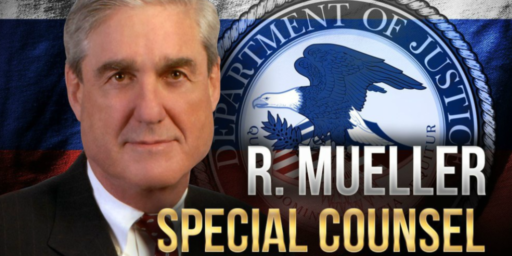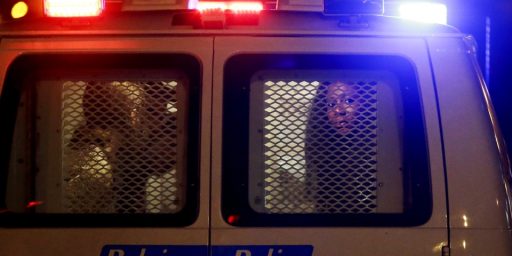Cops, Testilies, and Video Tape
The New York Times has a fascinating account of police using highly-edited videotape to bolster their lies on the witness stand.
Videos Challenge Accounts of Convention Unrest (NYT rss)
Dennis Kyne put up such a fight at a political protest last summer, the arresting officer recalled, it took four police officers to haul him down the steps of the New York Public Library and across Fifth Avenue. “We picked him up and we carried him while he squirmed and screamed,” the officer, Matthew Wohl, testified in December. “I had one of his legs because he was kicking and refusing to walk on his own.” Accused of inciting a riot and resisting arrest, Mr. Kyne was the first of the 1,806 people arrested in New York last summer during the Republican National Convention to take his case to a jury. But one day after Officer Wohl testified, and before the defense called a single witness, the prosecutor abruptly dropped all charges.
During a recess, the defense had brought new information to the prosecutor. A videotape shot by a documentary filmmaker showed Mr. Kyne agitated but plainly walking under his own power down the library steps, contradicting the vivid account of Officer Wohl, who was nowhere to be seen in the pictures. Nor was the officer seen taking part in the arrests of four other people at the library against whom he signed complaints.
A sprawling body of visual evidence, made possible by inexpensive, lightweight cameras in the hands of private citizens, volunteer observers and the police themselves, has shifted the debate over precisely what happened on the streets during the week of the convention. For Mr. Kyne and 400 others arrested that week, video recordings provided evidence that they had not committed a crime or that the charges against them could not be proved, according to defense lawyers and prosecutors.
[…]
Video is a useful source of evidence, but not an easy one to manage, because of the difficulties in finding a fleeting image in hundreds of hours of tape. Moreover, many of the tapes lack index and time markings, so cuts in the tape are not immediately apparent. That was a problem in the case of Mr. Dunlop, who learned that his tape had been altered only after Ms. Clancy found another version of the same tape. Mr. Dunlop had been accused of pushing his bicycle into a line of police officers on the Lower East Side and of resisting arrest, but the deleted parts of the tape show him calmly approaching the police line, and later submitting to arrest without apparent incident.
Kevin Drum observes, “[N]ot to put too fine a point on it, practically every time there’s videotape it turns out that cops have been pretty cavalier with the law. Doesn’t it make you wonder how often that’s the case when videotape isn’t available?”
None of this is surprising, really. Alan Dershowitz has popularized the word “testilying” for the practice of police officers being creative on the witness stand. In Congressional testimony on the pervasiveness of perjury in our judicial system, he quotes one officer:
Cops are almost taught how to commit perjury when they are in the Police Academy. Perjury to a policeman – and to a lawyer, by the way – is not a big deal. Whether they are giving out speeding tickets or parking tickets, they’re almost always lying. But very few cops lie about the actual facts of a case. They may stretch an incident or whatever to fit it into the framework of the law based on what they consider a silly law of the Supreme Court.
He also cites the Mollen Commission:
The practice of police falsification in connection with such arrests is so common in certain precincts that it has spawned its own word: “testilying.” . . . Officers also commit falsification to serve what they perceive to be “legitimate” law enforcement ends – and for ends that many honest and corrupt officers alike stubbornly defend as correct. In their view, regardless of the legality of the arrest, the defendant is in fact guilty and ought to be arrested.
The pervasiveness of the practice is impossible to quantify but there’s no doubt that it happens frequently. In most of the few criminal trials I’ve sat in on, I’ve seen police officers give eyewitness accounts that were so improbable as to be laughable. Mostly, I’m sure, this stems from sloppy decisions or poor observations made in the heat of the moment that required buttressing in order to assure conviction. My guess is that most of the lying is coached by prosecutors. Neither the cops nor the prosecutors really think they’re doing anything wrong, since they’re sure they’ve got the right guy. Mostly, they do. But the practice turns the criminal justice system on its head. And, aside from citizen skepticism, there’s not a hell of a lot we can do about it.
Elsewhere:
- Steven Taylor has some thoughts on the convention arrests themselves.
- Dan Gillmore considers the “citizen journalism” implications.






Hmm … how about jury instructions to the effect that “police officers in general typically lie under oath,” or words to similar effect?
At the NY Times site (link above), there is a good video of the reporter, with snippits of the referenced tapes. The link is under “Multimedia” on the right side. If you double-click on the video (in firefox at least), it will go to full screen.
Oh I am so sick of these liberals anyway. I don’t see so much of a problem hauling a few off to visit the jail for a few days.
Way to go, southernman. You miss the point of America.
Doubtless why his ancestors sought to secede?
Carp, Anderson, SM is playing you.
New York State recognizes no right to keep and bear arms, and New York City is especially contemptuous of citizens claiming those rights. So this is a little bit like hearing that Joseph Stalin’s cops lie. You cannot _be_ a cop in New York City without ignoring key parts of the Constitution.
Residents of New York City have chosen to make the police a person’s sole avenue of defense from violent criminals. Under such circumstances, you have to take whatever protection you’re offered.
It would be foolish to criticize cops who could get vengeance simply by quitely withdrawing their protection. They could even hint to predators that if forced to arrest them for attacking a certain person, they would be sure to “accidently” violate his “rights” — therefore getting the attacker off the hook.
If cops were to do this to New Yorkers I’d laugh. Don’t tell me this goes against what America stands for — New Yorkers have already rejected that.
Carp, Anderson, SM is playing you.
I’m easy that way.